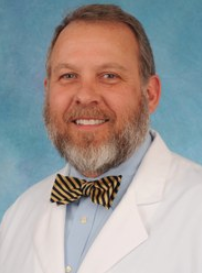Dr. Marvin McBride is assistant clinical professor of geriatric medicine and medical director of The Cedars of Chapel Hill Retirement Community.

What brought you to UNC Medical Center?
I came to UNC in 2013 for my geriatric fellowship, to re-enter clinical practice. I had been working as a full-time medical executive and had not provided direct patient care for several years.
I graduated from Wofford College in Spartanburg, SC, and medical school at Duke–where I met my wife who is now a pediatrician in Cary. This was followed by residency in family medicine at the University of Virginia. When we returned to NC, I began practicing at Raleigh Family Physicians, admitting to all three local hospitals (Raleigh Community Hospital (now Duke Health Raleigh), Wake Med, and later Rex Hospital), and all seven local nursing homes, while providing outpatient care to all ages, from newborns through seniors. I practiced medicine for 13 years, the last of which I became progressively more involved in medical administration.
Following the initial purely clinical phase of my career, I went on to become a full time medical executive for the next thirteen years. Early in that experience, I obtained an MBA from Kenan-Flagler Business School’s evening Executive MBA program. I worked as a medical director for several health insurance companies, and then as the chief medical officer of two more companies. In my eight years as a medical executive, I was involved in providing care and care management for high risk members of managed Medicare and Medicaid health plans, ultimately in 23 different states throughout this country. During that experience, working with health care systems caring for seniors in nursing homes, assisted living facilities, and at home, I saw first-hand the depth and breadth of the need seniors with multiple complex medical problems have for expert physician care, and the need for leadership within the health care systems to provide that care.
Where are you from?
I am a native of South Carolina, but I grew up in both SC and Eastern Tennessee. I’ve lived in the Triangle since 1986.
Did you always want to be a doctor?
Yes–I always had an interest in science and people. Medicine was an opportunity to merge my interests.
How did you choose your specialty?
I originally chose family medicine because I liked the variety and challenge of dealing with a broad spectrum of people and medical problems. I decided to focus on geriatrics after seeing first-hand the tremendous need in this clinical area across our nation.
What do you find most rewarding about your work?
It is most rewarding to become a trusted partner with patients and their families, as they negotiate the senior years. I also enjoy training young physicians.
What are some of the new developments in your field of specialty?
A meaningful number of seniors are now being included in studies that aim to sort out the risk/benefit of antihypertensive and cholesterol-lowering agents.
Is there a particular achievement (professional or personal) that has been most gratifying to you?
Prior to coming to UNC, I was responsible for the development and implementation of care and care management programs for the frail elderly in nursing homes and in their own homes, across multiple states, that improved patient/family satisfaction and reduced utilization and costs.
If you weren’t a physician, what would you like to be doing?
Industrial engineering. My dad was an engineer, and one of my sons is an engineer. It requires you to have a good sense of the big picture to recognize system issues, to find ways to optimize processes and make them more efficient.
What hobbies do you enjoy?
I started out autocrossing in a Miata, which is a timed competition through a defined course. Then, I became interested in high performance automobile driving. The skills needed to drive are not intuitive, and you don’t think of anything else while you’re driving. It’s an intense and refreshing experience. As an instructor, it’s fun to see people get better at it, which is a lot like training physicians in geriatric medicine.